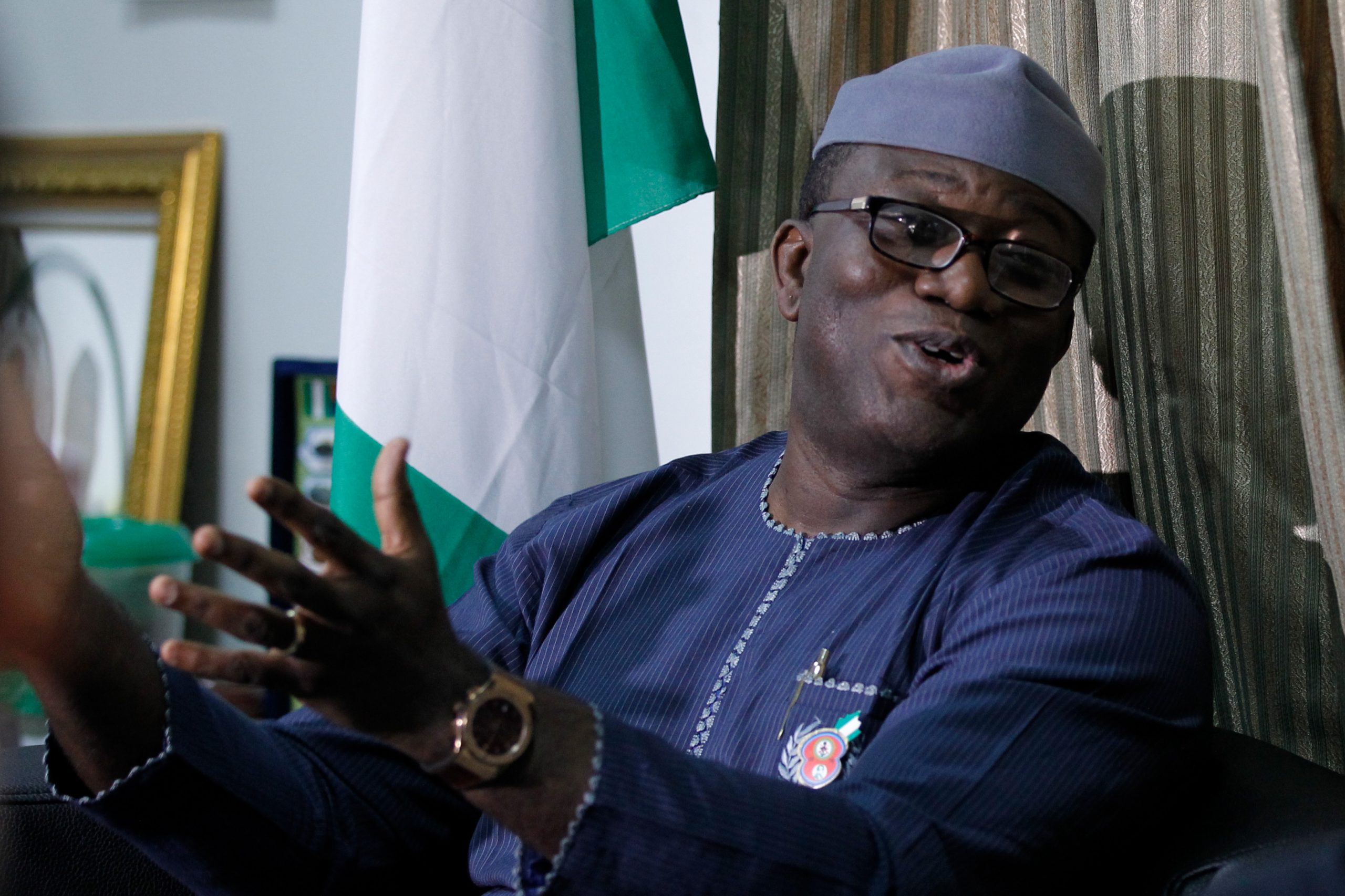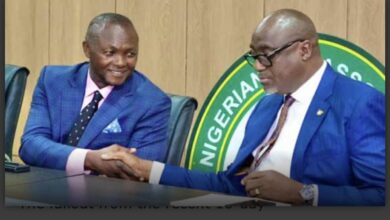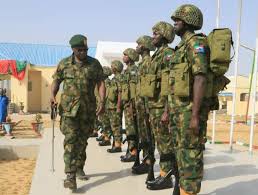
Fayemi: A thousand reason for the 2022 Yoruba Man of the Year Award at 58
Irohinoodua Editorial February 09, 2023
Tall and strongly built, with a trademark gap between his incisors, Kayode Fayemi clocked 58 years on February 9. Not known for parties and ceremonies, the day, as usual was marked in solemnity that speaks to his character. But few friends still went ahead to place advertisements in newspapers to thumb up his glory. His aides said on his latest birthday, he spent the time attending to the needy and the vulnerable.
At a critical moment in Nigeria and Yoruba history, men and women of critical minds are needed but in short supply. The National Elections come up this month. The country has thrown up at least six major Presidential candidates out of which three of them are from Yorubaland amidst doubts that the election will hold in the first place and in the face of a factionalised, deeply divided Nigeria and Yoruba Nation too.
The election is coming at a time of national grief arising from economic and political meltdown both at the local and national levels. For the Yoruba people, the elections are coming at a time when leadership flounders and the grandeur of the race goes dim, poverty grows wings, anger and desperation rule the hearts of mankind. Any light giver of hope is a source of great comfort. The country, Nigeria and Yoruba nation are both in dire need of salvation from great thinkers who can rally the people and bring hope where there is despair.
In January 2022, Irohinoodua Media Services, declared Dr John Olukayode Fayemi as the Yoruba Man of the Year 2022. Since the declaration, our emails and calls have been filled with comments. It fills the heart with joy, that over 90 percent of respondents agree with us. As he marks his 58th birthday, we, provide more information about the subject matter, for local and international audience and to the glory of history. Irohinoodua had delayed the tribute that led to his selection as the Yoruba Man of the Year 2022 until his two years less than 60th birthday.
A time like this needs men of great virtues. Who are the people that will and can save Nigeria from self inflicted ruin? Fayemi’s path to honour began in 1965 when he was born at Ibadan, the most significant political city in Yoruba ancient and modern history. ‘He was such a gifted child, cool, calm and collected. He was also decent, self conscious with a deep sense of justice’ says one of his classmates at the ICC primary School, Agodi, Ibadan where he was a pupil between 1970 and 1975. His parents enlisted him at Christ School, Ado Ekiti, the first secondary school in the then Ekiti Province and reputed to have produced more Professors than any other secondary school in Nigeria. One of his room mates at Christ School said he was known for standing on the side of truth, noted for his advocacy for human liberty and always at hand to protect junior students who faced persecution from their seniors.
‘He hated bullying and would do his domestic work without depending on the school boy assigned to him being the practice of the time’ said another who shared the same class with him. At the then Universities of Ife and Lagos, Fayemi was noted for his outspokenness against tyrannical policies of the state and sometimes of the schools, leading on many occasions the mobilization of students on the streets against several anti-people policies of that era.
His political career thus started in his University days. It was not a surprise to many when he joined the pro-democracy campaigns in the 1990s, the peak of the campaign coming after the annulment of the June 12, 1993 Presidential election.
His education between 1989 and 1992 at the Kings College, London where he specialized in War Studies with emphasis on Civil-Military Relations strengthened his capacity to be a huge asset to the bitter pro-democracy campaigns which saw to the murder of many by the military junta.
Fayemi himself escaped only by share luck when while on a revolutionary assignment on behalf of the Nigerian pro-democracy struggle, the plane he was travelling in had an emergence stop-over in Lagos. His assumption then was death had come. He was topmost on the wanted list, a booty on his head. Deadly agents had been hired, including mercenaries from outside Nigeria, to hunt him down.
The nervous military combed the plane, looking of any threat, but he was lucky not to be caught, by providence. Some said he had disguised. At that turbulent moment, he traveled by air, by road across Africa, Europe and America meeting state governments and building cells, sometimes in disguise to cross dangerous borders where the military had their spies, all in the bid for a free and democratic Nigeria. On several occasions, he escaped assassination plots.
Before leaving the shores of Nigeria, Fayemi was in Sokoto where he served at the Nigeria-Police Training College. One of his colleague, a native of Sokoto, who served with him in an email to Irohinoodua described him as ‘honest, humble and reliable.’ He said ‘He was kind-hearted, a man of few words, intelligent and a master of diplomacy with a very deep heart.’ His close aide said his network across Nigeria, including in the core North, helped him, in part to survive the plot of the military dictators.
Fayemi also worked as a Research Officer at the African Research and Information Bureau in London and later became a Tutorial Fellow at the War Studies Department at Kings College, London during his doctoral studies. In mid 1990s, he was the Strategy Development Adviser of Deptford City Challenge in London. He eventually became Secretary General of the Media Empowerment for Africa (The Radio Foundation)
Coming back to Nigeria, he established the Centre for Democracy and Development, (CDD) now led by Prof Jubrin. The CDD is one of the most outstanding pillars of democratic engagements in Nigeria since 1999. He had lectured in Europe, Asia, North, and Latin America where many state Governments and civil society sought his services on institutional building, poverty eradication and sustainable development receiving glowing trophies in each encounter.
Before he became the Governor of Ekiti State, he was a resource person for the United Nations Millennium Development Goals, (MDG) and an expert consultant with the Economic Community of West African States, (ECOWAS) and the United Nations Economic Commission for Africa.
He was Chairman, Commonwealth Human Rights Initiative’s Committee of Experts on developing guiding principles and mechanisms of constitution making in Commonwealth Africa.
He launched into Nigerian electoral politics in 2007 following the decision of the Action Congress, (AC) to present him as the Ekiti State Governorship candidate.
The 2007 election saw massive movement of pro-democracy groups from all over Nigeria and abroad into Ekiti. He was robbed of victory expectedly, given the force of reactionary elements in charge of the affairs of Nigeria at the top echelon.
He did not go to sleep. He went back to the people. The revolutionary movement was irresistible, gaining national and global attention. For his first four years, after retrieving a mandate stolen at gunpoint, Fayemi silently attacked the entrenched, corrupt civil and public service, drawing resistance and the ire of principalities in the state.
He introduced biometrics, cutting off the hands of nigthfingers and rogues to save huge funds; he was the first to introduce one-child-one laptop to Nigerian schools and the first to introduce social welfare in Nigeria covering over 20,000 adults, brought back the first Diary factory in the SouthWest after he rekindled the dead Ikun Diary farm, a practical way of addressing so many issues like milk and diary products, animal husbandry and providing an indigenous alternative that addressed practically the herdsmen-farmers clashes by providing beef alternative to his people.
He also built the first Cargo Airport in the South West with service opportunities to adjacent states of Kogi, Kwara, Edo and even Delta and the Middle Belt. One of his most ambitious projects is the Trans-South West Highway which he had started in Ado-Ekiti.
Unlike most dual carriage ways, his government explored a virgin land, breaking monuments of huge rocks to pave the way for the legendary route which is expected to crisscross Ekiti, through Aramoko, to Osun, Oyo, Ogun and Lagos State. Other South West States are expected to take up the project from their ends.
The Southern part of the project he had enhanced through the African Bank Development Bank, (AFDB) which provided the support for the Ekiti-Ondo dual carriage way linking the Ado sector. He built a world class highway from Ekiti to Kogi State through Irele-Ponyan on the Northern frontier of Ekiti State prompting several traditional rulers in Kogi State to pay him a visit of appreciation.
Fayemi also initiated the Western Nigeria Security Network which he began since 2010 which the Peace Corps. His engagement of the other South West Governors for regional integration is unequalled. All he did in Ekiti were in the face of almost arid funds, being almost the lowest on the scale of preferences among the 36 states of the Federation. The monthly allocation is barely enough for the workers’ salary. On June 18, he led the first intra-party transition when His Excellency, Abiodun Oyebanjo emerged as the State Governor. At present, Oyebanji is seen as one of the most promising achievers. At 58, there is no doubt that history and the world awaits Fayemi, on a large scale, for his unstoppable human and institutional transformation to the good of mankind. What else is to be added Happy? His wife, Erelu Bisi Fayemi is as iconic as his husband, in history, space and time. Happy Birthday.





